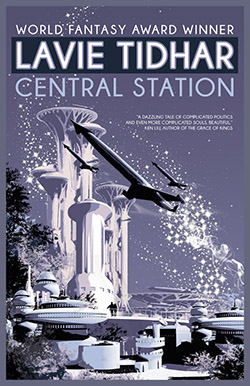World Fantasy Award winner Lavie Tidhar rewrites the rules of the short story collection in Central Station, an ambitious assemblage of thirteen tales tall but indubitably true that are all the more remarkable when read together.
“Substantially different versions” of eleven of the efforts it collects were previously published, in various venues, between November 2011 and September 2014, and the handful of them that I read then impressed me immensely. ‘The Smell of Orange Groves‘ and ‘The Lord of Discarded Things,’ for instance, represented intimate glimpses into the lives of a few of the disaffected folks who call the “bordertown” at the base of the Central Station spaceport home.
In one, after decades in the Belt, birthing doctor Boris Chong returns to his roots to tend to his ailing parent, only to end up hooking up with his childhood sweetheart Miriam Jones, who’s grown older in the intervening years—as has he—and adopted a boy. In the other, Ibrahim, an alte-zachen man, or “junk gypsy,” finds a genetically modified messiah in a small shoebox, and resolves to raise him himself—free of his fate as far as is possible in a place like Central Station, which is so rife with religion that it boasts a “faith bazaar.”
They were little things, those stories; lovely, and lively, and large of heart, but little, admittedly. Not so in Central Station, which generously extends the two tales I’ve touched on at the same time as seamlessly stitching together their characters and narratives with those of the other eleven featured here.
We learn, latterly, of Boris’ involvement with Carmel, a strigoi, or data vampire, who follows him home and moves in with Miriam’s oddball brother, a hoarder of old-style stories deemed disabled because he’s unable to take part in the so-called Conversation:
Achimwene often wondered what the Conversation was like. He knew that, wherever he passed, nearly anything he saw or touched was noded. Humans, yes, but also plants, robots, appliances, walls, solar panels—nearly everything was connected, in an ever-expanding, organically growing Aristocratic Small World network, that spread out, across Central Station, across Tel Aviv and Jaffa, across the interwoven entity that was Palestine/Israel, across that region called the Middle East, across Earth, across trans-solar space and beyond, where the lone spiders sang to each other as they built more nodes and hubs, expanded farther and farther their intricate web. He knew a human was surrounded, every living moment, by the constant hum of other humans, other minds, an endless conversation going on in ways Achimwene could not conceive of. His own life was silent. He was a node of one. He moved his lips. Voice came. That was all.
Crucially, Carmel connects with Achimwene in a way he’s always wanted, however her arrival also rather rocks the close-knit community Central Station is interested in—and of course it complicates Boris’ renewed relationship with Miriam. Meanwhile, the infant Ibrahim adopts becomes the boy Ismail, and Ismail, alongside Miriam’s own adopted son Kranki, has a revelatory role to play in the whole.
And all that? That’s just the start. Central Station isn’t a particularly lengthy collection, but its brevity belies the ambition of a typical trilogy. It has an expansive cast of characters; more than enough, as a matter of fact, to justify the appendix Tidhar appends to the text—not that I ever felt the need to refer to said, as almost all of the people we see are given his or her or its own time to shine.
Likewise, the overarching events Tidhar delicately threads through his third collection are absorbing in and of themselves, but at the same time, they open the door for the author to explore an embarrassment of ideas, including but not limited to the ascent of artificial intelligence, the aftermath of the technological singularity, robots as “an awkward evolutionary step between human and Other,” Earth’s place in settled space, and finally—for this paragraph if not the narrative—the future of faith.
And there are so many dimensions to Central Station‘s superlative setting:
Inside Central Station the passengers dined and drank and played and worked and waited—Lunar traders, Martian Chinese on an Earth holiday package tour, Jews from the asteroid-kibbutzim in the Belt, the hurly burly of a humanity for whom Earth was no longer enough and yet was the centre of the universe, around which all planets and moons and habitats rotated, an Aristotelian model of the world superseding its one-time victor, Copernicus.
But Boris and Miriam and Carmel and Achimwene and Ibrahim and Ismail and Kranki—not to mention the many other figures of significance to this fiction—don’t call Central Station itself home. Rather, they live in its long and long-lasting shadow, such that they “could always look up and see the station. It rose into the clouds, a signpost and a promise of what lay beyond.”
Fulfilling that awesome promise—leaving Neve Sha’anan at last—is not nearly so easy for our unfortunate few; nor, indeed, was bidding goodbye to this exceptional collection an elementary experience for me. With each transmuted tale “a node linking the whole into something greater than its parts,” Central Station is without question the best assemblage of short stories I’ve read in recent memory.
Sublimely sensual, emotionally moreish, and composed with crystalline clarity irrespective of its incredible complexity, if this is “what SF is going to look like in the next decade,” as editor extraordinaire Gardner Dozois declares, then readers: the next ten years will be olsem diffren indeed—which is to say the same, but different, in asteroid pidgin.
Central Station is available May 10th in the US and May 26th in the UK from Tachyon Publications.
Read an excerpt here on Tor.com.
Niall Alexander is an extra-curricular English teacher who reads and writes about all things weird and wonderful for The Speculative Scotsman, Strange Horizons, and Tor.com. He lives with about a bazillion books, his better half and a certain sleekit wee beastie in the central belt of bonnie Scotland.










